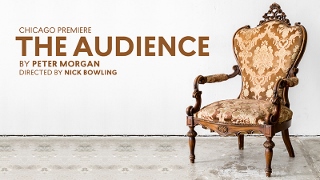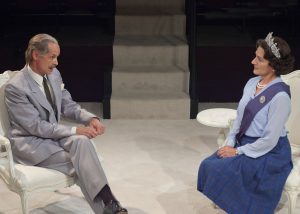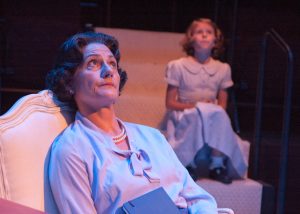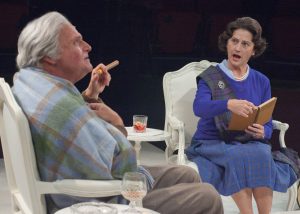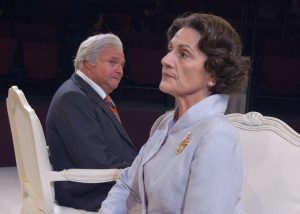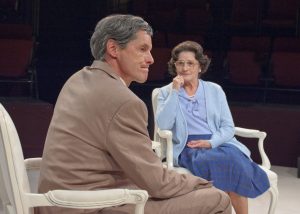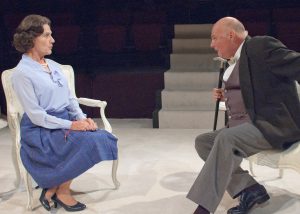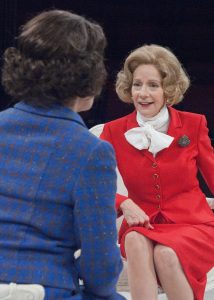TUESDAYS WITH ELIZABETH
IN A NOT SO PRIVATE PALACE
Peter Morgan is the proverbial fly on the wall: Commanding the realm of royal fiction and other historical speculation, this British writer has penned the Netflix series The Crown, as well as the astute films The Queen, Frost/Nixon, The Last King of Scotland, and The Other Boleyn Girl. The ultimate insider, Morgan puts himself in rooms, costumes, situations and eras that he could never know firsthand. But his enlightened wonderment (what might have been!) enthralls and intrigues audiences and graces the talents of Dame Helen Mirren and more. It’s also given TimeLine Theatre Company their latest triumph.
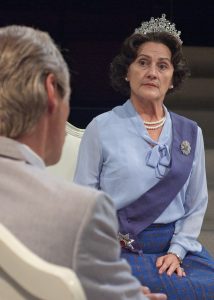 Employing five of Chicago’s top thespians, Nick Bowling superbly conducts the dramatic orchestrations of Morgan’s The Audience. It’s a perfect choice for TimeLine: The two-act drama is a concentrated chronicle across 63 years and a baker’s dozen of British Prime Ministers from Winston Churchill to David Cameron. (Left out are Harold Macmillan, Sir Alec Douglas Home, and Edward Heath.)
Employing five of Chicago’s top thespians, Nick Bowling superbly conducts the dramatic orchestrations of Morgan’s The Audience. It’s a perfect choice for TimeLine: The two-act drama is a concentrated chronicle across 63 years and a baker’s dozen of British Prime Ministers from Winston Churchill to David Cameron. (Left out are Harold Macmillan, Sir Alec Douglas Home, and Edward Heath.)
Connecting the delightfully diverse scenes in Morgan’s sprawling saga is the institutional urgency of the Tuesday afternoon audience at Buckingham Palace or Balmoral Castle. This private conference between the ever-changing head of government and the constant monarch (the “unbroken line”) provides setting and stories for Morgan’s unchronological 130 minutes. The bravura result is a feat of cunning contrasts, glorious gossip, intellectual imaginings, and pyrotechnical performances.
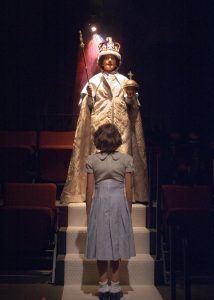 At the heart of these meetings of the minds is, of course, the Presence herself. Ageless between 1952 and 2015, Janet Ulrich Brooks depicts Elizabeth Windsor, the second queen of her name, as a work in progress, staunchly protective of her divine right to rule (as she proclaims at the end of the first act) while complying with a constitutional monarch’s duty to consult rather than to rule.
At the heart of these meetings of the minds is, of course, the Presence herself. Ageless between 1952 and 2015, Janet Ulrich Brooks depicts Elizabeth Windsor, the second queen of her name, as a work in progress, staunchly protective of her divine right to rule (as she proclaims at the end of the first act) while complying with a constitutional monarch’s duty to consult rather than to rule.
Amused where her great grandmother Empress Victoria was not, more touchstone than lodestone, Ulrich’s arch Elizabeth is fascinated by the perverse parallels that politics provides. The most horrific example: Both the unctuous Tony Blair (Matt DeCaro) and a fear-mongering Anthony Eden (Mark Ulrich) urge the same thing: “Go in now and go in hard!” The former unindicted war criminal argues for an unjustified invasion of Iraq over weapons of mass destruction. The latter cynically rationalizes the equally boneheaded British occupation of the Suez Canal. Both were foreign-policy disasters of incalculable damage. Alas, Her Majesty can advise, but she can’t stop stupidity in action.
Putting out fires, trouble-shooting, doing damage control, we see Elizabeth contend with contentious pols for whom the British people matter more as voters than subjects. Elizabeth, however, must defend the faith, protect the Commonwealth and safeguard “the brand.”
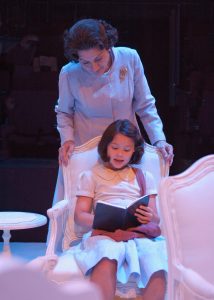 So collisions are inevitable’”from the start. In 1952 she stands up against Winston Churchill who cynically seeks to postpone her coronation so he can buy time for a second run at the top office. (Nonetheless the young queen found in him the best mentor since Lord Melbourne schooled Victoria.) A self-effacing John Major (Ulrich), the ultimate upper-class twit and dimwitted duffer, must be bucked up, even as the mother of a refractory Prince of Wales deals with the late Princess Diana’s dangerous popularity (and anti-monarchical prejudices) and the terrible fire that struck Windsor Castle in 1992, Elizabeth’s “annus horribilis.” Upset over perceived insults from Barrack Obama, David Cameron (Ulrich) is also afraid that the Queen’s dogged guardianship of the 50+ states of the Commonwealth could interfere with England’s desire to join the European Union: This foolish man must have his priorities corrected. (What could possibly go wrong here?)
So collisions are inevitable’”from the start. In 1952 she stands up against Winston Churchill who cynically seeks to postpone her coronation so he can buy time for a second run at the top office. (Nonetheless the young queen found in him the best mentor since Lord Melbourne schooled Victoria.) A self-effacing John Major (Ulrich), the ultimate upper-class twit and dimwitted duffer, must be bucked up, even as the mother of a refractory Prince of Wales deals with the late Princess Diana’s dangerous popularity (and anti-monarchical prejudices) and the terrible fire that struck Windsor Castle in 1992, Elizabeth’s “annus horribilis.” Upset over perceived insults from Barrack Obama, David Cameron (Ulrich) is also afraid that the Queen’s dogged guardianship of the 50+ states of the Commonwealth could interfere with England’s desire to join the European Union: This foolish man must have his priorities corrected. (What could possibly go wrong here?)
Imperiously insisting on the throne’s prerogatives, Elizabeth refuses to become just “a postage stamp with a pulse.” She witheringly upholds her right not to pay income taxes (which would make the royals just like everyone else), her expensive yacht Britannia (essential to oversee her far-flung ex-empire), the freezing Scottish weather of her beloved Balmoral, and her dithering husband’s right to be wrong. Not even the flu (dismissed as a cold) will stay her “obligation.”
Her favorite prime minister is’”who could guess?’”the amiable vulgarian Harold Wilson (DeCaro), a Labor lout whose blunt tough talk, gruff refusal to be intimidated by the magnificent chandelier above them, and painful confession of incipient dementia keep things real. The improbable duo finds common cause in a shared O.C.D. which they’ve managed to channel into productive activities.
Perhaps Elizabeth’s least liked leader is an arrogant arriviste who thought herself a queen’”the parvenu Margaret Thatcher (a sinisterly smiling Carmen Roman). A silky-mean clash occurs when Thatcher accuses her sovereign of bad-mouthing’”through second-hand smears’”her reactionary Conservatives in the tabloids. Elizabeth in turn condemns the “Iron Lady” for union-busting and refusing to institute sanctions against apartheid in South Africa where Thatcher’s corrupt husband just happens to have business interests. It’s almost scientifically precise how each brings out the best and worst in the other.
Most poignant is Morgan’s use of the Queen’s discerning “Jeeves,” an Equerry (David Lively) who impassively describes the state rooms and unfailing registers the Queen’s reactions to the absurdities she encounters. Just as persuasive and even more intimate are imagined visits from a “Young Elizabeth” (Audrey Edwards alternating with Sophie Ackerman), a lonely princess who affectingly learns from her older self the privileges and restraints of becoming both the world’s richest woman and the embodiment of the United Kingdom’s lost glories.
Morgan’s pointed, eloquent, and even comical dialogue never dares to “shine daylight on magic,” the kind of scrutiny that the Windsors most dread. That, of course, would kill the essential illusions of hereditary monarchy. Nonetheless, his Elizabeth, cunningly conveyed with “less is more” sangfroid by Brooks, and her calculatedly informative Prime Ministers (also including Ulrich’s feckless Gordon Brown), intricately conveyed by three master actors, are very present and accounted for. The Audience may lack the drive and dynamism of Shakespeare’s history plays, but that only proves its truth to our times. These delightful-to-disconcerting “dustups” between Crown and citizens include us all. Talk about a crucial consultation!
The Audience
TimeLine Theatre, 615 W. Wellington Ave.
Wed & Thurs at 7:30; Fri at 8;
Sat at 4 & 8; Sun at 2
(check for additional performances)
ends on November 12, 2017
EXTENDED to December 3, 2017
for tickets, call 773.281.8463 x 6
or visit Timeline
for more shows, visit Theatre in Chicago
